
- •Politics this week
- •Business this week
- •On Israel and the Jewish diaspora
- •Who are the champions?
- •Tomorrow the world
- •Home and abroad
- •Driving east
- •In the steps of Adidas
- •The chic and the cheerless
- •Not what it was
- •Funny business
- •Acknowledgments
- •Offer to readers
- •The Richard Casement internship
- •David Rattray
- •Overview
- •Output, prices and jobs
- •The Economist commodity-price index
- •The Economist poll of forecasters
- •Trade, exchange rates, budget balances and interest rates
- •Markets
- •Trade and output


|
SEARCH |
|
|
|
|
RESEARCH TOOLS |
|
|
|
|
|||
|
|
|
|
|
Economist.com |
|
|
|
Choose a research tool... |
|
|
|
|
|
|
|
|
advanced search » |
|
|
|
|
Subscribe |
Activate |
Help |
||
|
|
|
|
|
|
|
|
|
|
|
|
|
|
Friday February 9th 2007 |
|
|
|
|
|
|
|
|
|
|
|||
|
|
Welcome |
|
|
= requires subscription |
|
|
My Account » |
Manage my newsletters |
LOG OUT » |
|||
|
|
|
|
|
|
|
|
|
|
» |
|
|
|
PRINT EDITION
Print Edition February 10th 2007
On the cover
Why George Bush should resist a Wagnerian exit from the White House: leader
Previous print editions
Feb 3rd 2007
Jan 27th 2007
Jan 20th 2007
Jan 13th 2007
Jan 6th 2007
More print editions and covers »
Subscribe
Subscribe to the print edition
Or buy a Web subscription for full access online
RSS feeds
Receive this page by RSS feed
 Full contents Enlarge current cover
Full contents Enlarge current cover
Past issues/regional covers Subscribe
NEWS ANALYSIS
POLITICS THIS WEEK
BUSINESS THIS WEEK
OPINION
Leaders
Letters to the editor
WORLD
United States
The Americas
Asia
Middle East & Africa
Europe
Britain
International
Country Briefings
Cities Guide
SURVEYS
BUSINESS
Management Reading
Business Education
Executive Dialogue
FINANCE & ECONOMICS
Economics Focus
Economics A-Z
SCIENCE & TECHNOLOGY
Technology Quarterly
PEOPLE
Obituary
BOOKS & ARTS
Style Guide
MARKETS & DATA
Weekly Indicators
Currencies
Big Mac Index
DIVERSIONS
RESEARCH TOOLS
CLASSIFIED ADS
DELIVERY OPTIONS
E-mail Newsletters
Mobile Edition
RSS Feeds
Screensaver
ONLINE FEATURES
Cities Guide
Country Briefings
Audio interviews
Classifieds
Economist Intelligence Unit
Economist Conferences
The World In
Intelligent Life
CFO
Roll Call
European Voice
EuroFinance Conferences
Economist Diaries and
Business Gifts
Advertisement
The world this week
Politics this week
Business this week
Leaders
America and Iran
Next stop Iran?
Digital music
Music wants to be free 
Private equity
Caveat investor 
Bird flu and public health
Under the influence 
Bangladesh
Not uniformly bad 
Letters
On Israel and the Jewish diaspora
Special Report
Dealing with Iran
A countdown to confrontation
Israel and Iran
How MAD can they be?
United States
The budget
Fiscal frustrations
The politics of the Iraq war
Showcasing disunity
Los Angeles' homeless
On the skids
Reviving Newark
The phoenix of New Jersey?
Shooting wolves
In danger again
Environment awareness
No child left inside
Health care
God, sex, drugs and politics
Visa policy
Keeping out more than terrorists
Lexington
Rudy rising
The Americas
Haiti
Building a reluctant nation
Brazil
Parliament or pigsty?
Argentina
Cooking the books
Peru
Sweet times
Paraguay
The next Chávez?
Asia
Bangladesh
Everybody but the politicians is happy
Japanese justice
Confess and be done with it
South-East Asia
Let's all bash Singapore
Australia's culture wars
To flag or not to flag
Chinese babies
The golden pig cohort
A survey of European business
Who are the champions?
Tomorrow the world 
Home and abroad 
Driving east 
Buy, buy, buy 
In the steps of Adidas  The chic and the cheerless
The chic and the cheerless  Not what it was
Not what it was 
Funny business 
Acknowledgments
Offer to readers
Business
The future of television
What's on next
Electronic Arts
Looking forward to the next level
Alstom v Bombardier
Train wars
German wine
Better Spätlese than never
Aviation in China
Lofty ambitions
Qantas Airways
Fasten your seat belts
Managing the military
Back to school for the admirals
Face value
Digging deep
Special Report
Private equity
The uneasy crown
Finance & Economics
Japan's currency
Carry on living dangerously
Weather risk
Come rain or come shine
Buttonwood
Mutiny in the ranks
American property
Quite a performance
Pensions for musicians
When they're 64
China's stockmarket
Hot and cold
Cash-handling in Germany
We were Heros
Economics focus
A fluid concept
Science & Technology
Biotechnology
Roses are blue, violets are red
Children's medicine
The ideal versus the best
Economics and anthropology
Patient capital
Climate change
Heating up
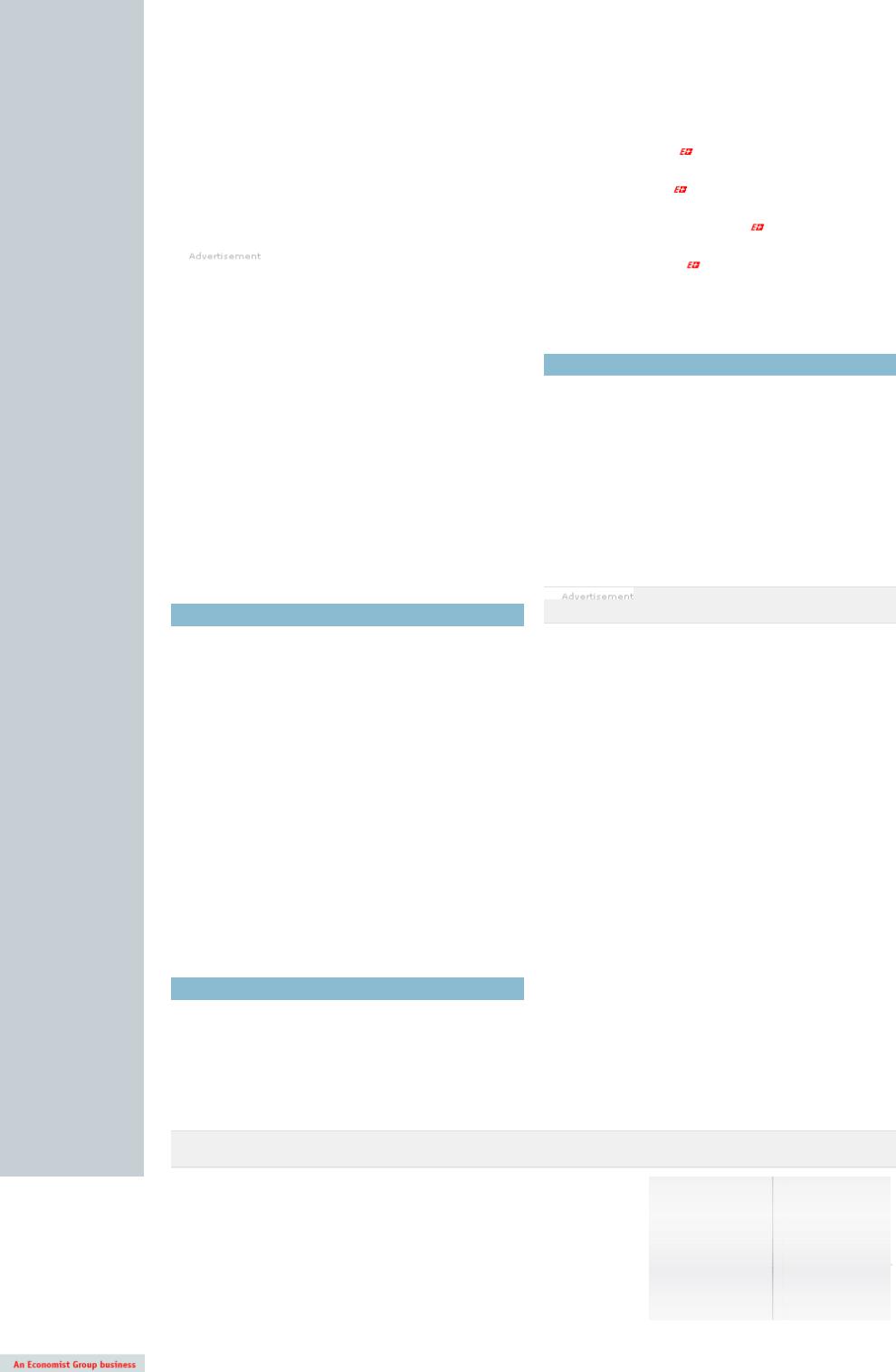
Middle East & Africa |
|
The Richard Casement internship |
|
|
|
||
Russia and the Middle East |
|||
|
|
||
The bear is happy to be back |
|
Books & Arts |
|
The Gulf states |
|
|
|
|
A critic of Islam |
||
Buying up art and culture |
|
||
|
Dark secrets |
||
|
|
||
Somalia |
|
American politics |
|
It isn't nearly over |
|
||
|
My life as an insider |
||
|
|
||
South Africa |
|
British political history |
|
Looking in the mirror |
|
||
|
First among equals |
||
|
|
||
Congo |
|
Amazon worldwide bestsellers |
|
Keep the United Nations engaged |
|
||
|
The history boys (and one girl) |
||
|
|
||
|
|
Jacopo Tintoretto |
|
|
|||
|
|
A tribute well earned |
|
|
|
|
|
|
|
|
|
|
|
Obituary |
|
Europe |
|||
|
|
||
|
|
||
|
|
|
The Caucasus
Hanging together
Germany's nuclear power
A policy of denial
Europe's car emissions
Setting the target
Albania's energy problem
Switching on the lights
Italian football
An unflattering reflection
Turkey's Kurds
Let justice be done
Charlemagne
Berlin Minus
Britain
Parliamentary reform
What the Lords are for
A soldier's death
Mistaken identity
Sainsbury's
A trolley too far
Bird flu
Unruffled
Public-sector efficiency drive
Flaky figures 
The attorney-general
In the firing line 
Regenerating Blackpool
The last resort 
Bagehot
The real Labour funding crisis
 Articles flagged with this icon are printed only in the British edition of
Articles flagged with this icon are printed only in the British edition of
The Economist
David Rattray
Economic and Financial Indicators
Overview
Output, prices and jobs
The Economist commodity-price index
The Economist poll of forecasters
Trade, exchange rates, budget balances and interest rates
Markets
Trade and output
International
Muslims and socialists
With friends like these
Gifted children
Bright sparks
The World Bank and corruption
My beautiful laundrette
Advertisement
Classified ads |
|
|
|
|
|
|
Sponsors' feature About sponsorship » |
|
|
|
|
|
|
|
|
|
|
Jobs |
Business / |
Tenders |
Property |
Jobs |
Tenders |
|
|
|
Senior Operations |
Consumer |
WSI Internet - Start |
WORK FROM HOME |
Tenure Track |
Invitation for |
|
|
|
|
|
|
|
|||||
Manager, Financial |
WSI Internet - Start |
Your Own Business |
SALES REP. |
Position Available |
Prequalification |
|
|
|
Markets |
Your Own Business |
Business Opportunity |
NEEDED A SALES |
Assistant Professor of |
Hashemite Kingdom |
|
|
|
Terms of Reference |
Business Opportunity |
- WSI Internet Start |
REP IS NEEDED TO |
Geography Tenure- |
of Jordan Ministry of |
|
|
|
IFC Private |
- WSI Internet Start |
Your Own Business! |
BE WORKING FROM |
track Assistant |
Finance for Supply |
|
|
|
Enterprise |
Your Own Busines.... |
Profit.... |
HOME FOR |
Professor position, |
and |
|
|
|
Partnership |
|
|
EGOBOLIC |
starting.... |
Implementation .... |
|
|
|
Background .... |
|
|
TIMBERS INT'L. |
|
|
|
|
|
|
|
|
YOU.... |
|
|
|
|
|
|
|
|
|
|
|
|
|
|
About Economist.com | About The Economist | Media Directory | Staff Books |
| Advertising info | |
Career opportunities | Contact us |
||||||
|
|
|
|
|
|
|
|
|
|
|
|
|
|
|
|
|
|
|
Copyright © The Economist Newspaper Limited 2007. All rights reserved. Advertising Info | Legal disclaimer | Accessibility | Privacy policy | Terms & Conditions | Help |
|||||||
|
|
|
|
|
|
|
|
|
Produced by =ECO PDF TEAM= Thanks xxmama
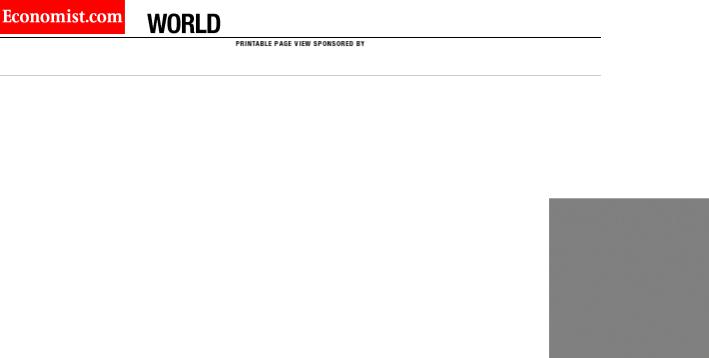
About sponsorship
Politics this week
Feb 8th 2007
From The Economist print edition
The Intergovernmental Panel on Climate Change, whose job it is to try to |
Reuters |
assess what is happening to the atmosphere, published its fourth scientific |
|
report on February 2nd. It concluded, in terms somewhat stronger than the |
|
third report, that things are indeed getting hotter, and that mankind is, indeed, |
|
to blame. What to do about it will be addressed in other reports to be published |
|
later this year. See article |
|
The European Commission said carmakers should be forced to increase the |
|
fuel efficiency of new cars by 20% within five years. Car companies said the |
|
target was an arbitrary figure and would lead to job losses in the EU as |
|
production moved elsewhere. See article |
|
Russian prosecutors charged Mikhail Khodorkovsky, the former boss of the Yukos oil company and a critic of President Vladimir Putin, with laundering over $20 billion. Mr Khodorkovsky, who is already serving an eight-year prison term for fraud, said the new charges were designed to prevent his early release.
Italy's foreign minister, Massimo D'Alema, denounced as “unfortunate outside interference” a letter to an Italian newspaper from the ambassadors of America, Australia, Britain, Canada, the Netherlands and Romania. The envoys had called on Italy to give greater support to the NATO mission in Afghanistan. See article
Two French Muslim groups sued a satirical magazine for defaming the Prophet Muhammad by reprinting cartoons first published last year in Denmark. Nicolas Sarkozy, France's centre-right presidential candidate, gave his support to the magazine.
Some 160,000 turkeys were gassed at a farm in Suffolk to stop Britain's worst outbreak of bird flu from spreading. See article
Put it in perspective
Flooding in Jakarta killed dozens of people and forced 340,000 to flee their homes. Indonesia is already struggling with an outbreak of dengue fever and is still grappling with bird flu, which has killed five people since the beginning of the year.
Thailand's military-backed government sacked the national police chief, ostensibly for failing to catch those who planted bombs in Bangkok on New Year's Eve. Separately, the government decided to reopen Bangkok's old airport, Don Muang, while it fixes the many faults found at the $4 billion Suvarnabhumi airport, opened only five months ago.
Vietnam's government unveiled plans for a $33 billion rail link between the capital, Hanoi, and Ho Chi Minh City in the south.
The design for a 40km (25-mile) atom smasher that will cost $8.2 billion was unveiled at a meeting in Beijing. Physicists want to discern one overarching set of laws that govern the universe and say the machine will help them make the discovery. The International Linear Collider, as it is known, will not start up until 2019 at the earliest and could be built in America, Japan or Switzerland.
Adding it all up

George Bush sent his budget to Congress. The $2.9 trillion request asks for more funding for the military and reduces spending on health care and other domestic programmes over five years. It also forecasts reduced federal deficits that eventually reach a surplus in 2012. Sceptics wondered how this could be twinned with Mr Bush's request to extend his tax cuts. See article
Rudy Giuliani confirmed he was entering the presidential race. Although he did not make a formal declaration, the former mayor of New York filed the usual campaign papers and told a TV interviewer that “I'm in this to win”. See article
The Senate was embroiled in debate on Mr Bush's policy on Iraq. Several resolutions ranging from support to outright condemnation of Mr Bush's plans have been produced and the parties are negotiating over which can proceed. See article
Dangerous digs
An explosion killed 32 miners at a rudimentary coal mine in north-eastern Colombia. Days later, a second blast at another mine in the centre of the country killed eight.
In Bolivia, more than 20,000 miners marched through the capital, La Paz, in |
AFP |
protest at plans by Evo Morales, the country's socialist president, for a sharp |
|
rise in taxes on mining. The government backtracked, saying the tax rise would |
|
apply to large privately owned mines and not to small mining co-operatives. |
|
Opponents accused Argentina's government of fiddling the country's inflation |
|
figure after a senior statistician was sacked and her replacement changed the |
|
methodology of the consumer-price index. The government said inflation in |
|
January was 1.1%; economists said it was 1.5-2%. See article |
|
More than a dozen gunmen attacked two state law-enforcement offices in the |
|
Mexican resort of Acapulco, killing seven people while videotaping the assaults. |
|
President Felipe Calderón sent some 8,000 troops to the area last month to crack down on drug- |
|
trafficking and organised crime. |
|
A new mission to accomplish
The killing in Iraq continued unabated, with at least 130 people, mostly Shias, dying in a single suicidebombing in a Baghdad market. A “surge” of extra American troops into Baghdad was set to begin in an effort to quell the sectarian violence.
The Palestinian president, Mahmoud Abbas, head of the Fatah party, and his Islamist rivals from Hamas, represented by their leader-in-exile Khaled Meshal, started talks in Mecca to end weeks of factional fighting in the Palestinian territories.
Egypt's president, Hosni Mubarak, ordered a band of Muslim Brothers, including the group's number three, to be tried in a military court. Lawyers said that 165 members of the Brotherhood, the country's most popular opposition group, have been detained since December.
In Mogadishu, the capital of Somalia, sporadic night-time mortars and rockets were launched at the presidential palace, hotels and the port, presumably by remnants of the Islamist fighters, most of whom were routed a month ago by Ethiopian troops. An African Union peacekeeping force has yet to be assembled. See article
At the end of an eight-country tour of Africa, China's president, Hu Jintao, said |
Reuters |
he would try to cut his country's $3 billion trade surplus with the continent. |
|

Copyright © 2007 The Economist Newspaper and The Economist Group. All rights reserved.

About sponsorship
Business this week
Feb 8th 2007
From The Economist print edition
Vornado Realty Trust withdrew its bid for Equity Office Properties, leaving the way clear for shareholders in America's largest real-estate investment trust to accept Blackstone Group's offer of $38.9 billion. The transaction sets a new record for a leveraged buy-out, underscoring the relentless takeover of public companies by private-equity firms. See article
Blackstone Group was one of four private-equity firms making up a consortium that expressed a keen interest in acquiring J. Sainsbury. The British supermarket chain has a market value of around £9 billion ($18 billion); if successful, the leveraged buy-out would be Europe's biggest. See article
London's latest landmark, the Gherkin, was sold for £600m ($1.2 billion), a record for the capital's booming commercial-property market. The seller, Swiss Re, will remain in the building as its main tenant until at least 2031.
Steve Jobs called for an end to digital-rights management technology that protects music sold over the internet. DRM was insisted upon by big record labels, but Mr Jobs thinks it is inhibiting the growth of the online-music market. Some observers reckoned that Apple's chief executive was trying to deflect criticism aimed at iTunes' own FairPlay system from regulators in Europe. See article
The long and winding road
Meanwhile, a settlement was reached in a trademark dispute between Apple and Apple Corps, the Beatles' music company. The agreement gives Apple ownership of all the “Apple” logo trademarks, but the computer-maker will license some trademarks back to Apple Corps. The two sides have been arguing since the early 1980s; fans now hope they can come together and make the Beatles' songs available on iTunes.
There was more bother for YouTube over copyright infringement. Viacom, the owner of MTV, asked that all of its content be removed from YouTube's website after the two sides failed to reach a distribution deal. Meanwhile, Jeff Zucker chose his first day as boss of NBC Universal to chastise YouTube for failing to address media copyright on video clips.
Eastman Kodak unveiled its line of desktop printers and low-cost ink cartridges. Troubled Kodak is hoping its new products will encroach on Hewlett-Packard and others by addressing consumers' gripes about the cost of replacement cartridges for their printers (by weight, the ink within them costs more than caviar).
A case to answer?
A three-man panel of a federal appeals court in San Francisco ruled that the biggest sex-discrimination case in American history could proceed against Wal-Mart as a class-action lawsuit. The suit was brought on behalf of past and present female employees, who claim the retailer is biased towards men in pay and promotion. An estimated 2m women could join it. Wal-Mart fulminated against the legal basis of the case and said it would fight all the way to the Supreme Court if it had to.
The long-running takeover battle for Endesa moved closer towards completion when the board of the Spanish energy company recommended E.ON's latest €41 billion ($53 billion) offer to shareholders.
HSBC said that high rates of bankruptcy in America's subprime mortgage market meant it would take a much higher charge than expected (estimated to be around $10.5 billion) on bad debts for 2006.

With the threat of huge lawsuits against cigarette-makers seemingly receding in the United States, Britain's Imperial Tobacco decided to enter the market, agreeing to buy America's Commonwealth Brands for $1.9 billion.
Chung Mong-koo, the chairman of Hyundai Motor, received a three-year prison sentence for embezzling company funds. The jail term surprised those used to the comparatively light sentences handed down in South Korean corporate cases. However, the court decided not to send the head of the country's biggest carmaker to his cell straightaway, citing the need to protect the national economy during his appeal. Investors have been pushing for more transparency in the country's chaebol.
Still full of eastern promise
The Shanghai stockmarket recovered somewhat after losing 11% of the value of its domestically traded shares in five days. The index surged last year, as improved earnings at Chinese companies spurred investor confidence. With one senior Chinese politician now warning that the market was overheated (and that most of the index's companies should be delisted), some pondered if this was the inevitable end to a Chinese bubble. Cooler heads said it was just a market correction. See article
Copyright © 2007 The Economist Newspaper and The Economist Group. All rights reserved.
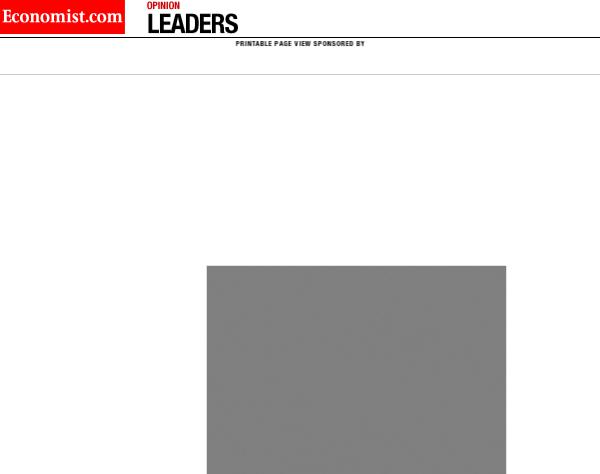
About sponsorship
America and Iran
Next stop Iran?
Feb 8th 2007
From The Economist print edition
Why George Bush should resist a Wagnerian exit from the White House
U.S. Air Force
Get article background
“WE ARE not planning for a war with Iran.” So said Robert Gates, America's new defence secretary, on February 2nd. You cannot be much clearer than that. With a weak and isolated president, and an army bogged down in the misery of Iraq, the American Congress and people are hardly in fighting mood.
Nonetheless, and despite Mr Gates's calming words, Iran and America are heading for a collision. Although the risk is hard to quantify, there exists a real possibility that George Bush will order a military strike on Iran some time before he leaves the White House two years from now.
America and Iran have been at loggerheads ever since Ayatollah Khomeini's revolution of 1979. But four things are making this old antagonism newly dangerous. One is Iran's apparent determination to build nuclear weapons, and a fear that it is nearing the point where its nuclear programme will be impossible to stop (see article). The second is the advent of Mahmoud Ahmadinejad, a populist president who denies the Holocaust and calls openly for Israel's destruction: his apocalyptic speeches have convinced many people in Israel and America that the world is facing a new Hitler with genocidal intent. The third is a recent tendency inside the Bush administration to blame Iran for many of America's troubles not just in Iraq but throughout the Middle East.
Any one of these would be destabilising enough on its own. Added together, they make the possibility of miscalculation and a slide into war a great deal more likely. That is all the more so when they are combined with a fourth new source of friction between America and Iran. This is the predicament of Mr Bush. A president who is now detached from electoral considerations knows that his place in history is going to be defined by the tests he himself chose to put at the centre of his foreign policy: bringing democracy to the Middle East and preventing rogue regimes from acquiring weapons of mass destruction. Given his excessive willingness to blame Iran for blocking America's noble aims in the Middle East, he may come to see a pre-emptive strike on its nuclear programme as a fitting way to redeem his presidency. That would be a mistake.
Never attack a revolution
This newspaper supported America's invasion of Iraq. We believed, erroneously, that Saddam Hussein was working to acquire nuclear weapons. And we judged that the world should not allow a mass-

murderer to gather such lethal power in his hands. In the case of Iran, the balance of risks points, though only just, in the other direction.
Even if it became clear that Iran was on the threshold of acquiring an atomic bomb, an American strike on its nuclear facilities would be a reckless gamble. Without America invading and occupying Iran— unthinkable after Iraq—such a strike would at best delay rather than end Iran's nuclear ambitions. It might very well rally support behind a regime that is at present not conspicuously popular at home, emboldening it to retaliate inside Iraq, against Israel and perhaps against the United States itself. Besides, it is far from clear exactly how dangerous a nuclear-armed Iran would be. Unlike Iraq under Saddam, Iran has a complex power structure with elements of pluralism and many checks and balances. For all its proclaimed religiosity, it has behaved since the revolution like a rational actor. To be sure, some of its regional aims are mischievous, and in pursuing them it has adopted foul means, including terrorism. But the ayatollahs have so far been shrewd calculators of consequences. There are already small signs of a backlash against the attention-seeking Mr Ahmadinejad. Like the Soviet Union, a nuclear Iran could probably be deterred.
But don't think Iran isn't dangerous
All of this suggests that in present circumstances it would be wrong for America to launch a military strike against Iran. But it would be the height of self-deception for anyone to jump to the conclusion that a nuclear-armed Iran would not be dangerous at all. It would be very dangerous indeed.
For a start, there is a danger that Iran's nuclear efforts will provoke a pre-emptive strike by Israel, which is already a nuclear power, albeit an undeclared one. For Israelis, whose country Mr Ahmadinejad says he wants to wipe off the map, it is not all that reassuring to hear that Iran can “probably” be deterred. Even if Israel were to decide against such a strike, Iran's going nuclear could destroy what is left of the international non-proliferation regime. It has proved hard enough for Arab states such as Egypt and Saudi Arabia to live with Israel's undeclared bomb; if their Iranian rival got one too, the race to copy might soon be on. On top of this is the danger that a nuclear Iran would feel safe to ramp up attempts to spread its revolution violently beyond its own borders.
Every effort should be made to stop an Iranian bomb. But there is a better way than an armed strike. In 2002 Mr Bush consigned Iran along with Iraq and North Korea to an “axis of evil”. Since 2004, for lack of good alternatives, he has been helping the efforts of Britain, France and Germany to talk rather than bludgeon Iran into nuclear compliance. Iran claims that its nuclear programme is for civil purposes only. Last year, the Europeans called its bluff by offering trade, civil-nuclear assistance and a promise of talks with America if it stopped enriching the uranium that could produce the fuel for a bomb. When Iran refused, diplomacy led in December to the imposition of economic sanctions by the Security Council.
This is a promising approach. The diplomacy at the United Nations proceeds at a glacial pace. But Iran is thought to be several years from a bomb. And meanwhile the Americans, Europeans, Russians and Chinese have at last all lined up on the same side of the argument. What is required now is a further tightening of the economic squeeze coupled with some sort of an incentive—most usefully an unambiguous promise from Mr Bush that if Iran returns to compliance with the nuclear rules it will face no attempt by America to overthrow the regime. Even then, America and Iran may be fated to lock horns in the Middle East. But the region, and the world, will be a good deal safer without the shadow of an Iranian bomb.
Copyright © 2007 The Economist Newspaper and The Economist Group. All rights reserved.
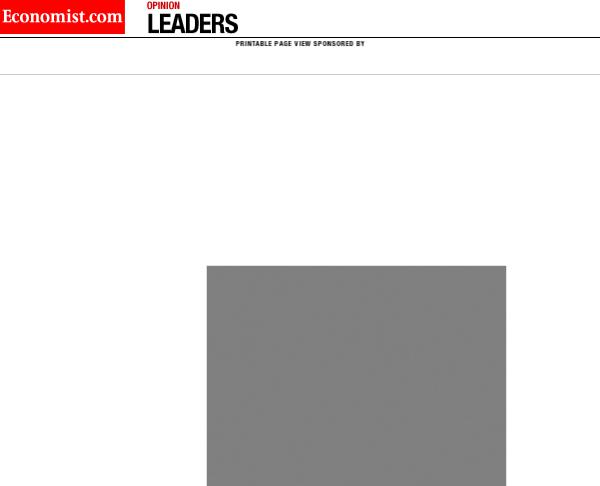
About sponsorship
Digital music
Music wants to be free
Feb 8th 2007
From The Economist print edition
Everyone will benefit if digital music is sold without copy-protection
Landov
IT IS not often that the company that dominates an industry, and is thus most wedded to the status quo, calls for the rules that govern the business to be changed. But that is what happened this week when Steve Jobs, the boss of Apple—which dominates digital music with its iPod music-player and iTunes music-store—published an essay on his firm's website under the unassuming title “Thoughts on Music”.
At issue is digital rights management (DRM)—the technology guarding downloaded music against theft. Since there is no common DRM standard, songs purchased for one type of music player may not work on another. Apple's DRM system, called FairPlay, is the most widespread.
European regulators have been gunning for Apple. They regard its refusal to license FairPlay as monopolistic. Since music from the iTunes store cannot be played on non-iPod music-players (at least not without a lot of fiddling), any iTunes buyer will be deterred from switching to a rival device. Last year, French lawmakers drafted a bill compelling Apple to open up FairPlay to rivals.
In the past, Apple has supported DRM on the grounds that it kept the pirates at bay. It described the French bill as “state-sponsored piracy”. But this week Mr Jobs gave an alternative explanation for defending DRM: the record companies' demands. They agreed to make their music available to iTunes only if Apple agreed to protect it using DRM; indeed, they can still withdraw it if the DRM system is compromised. Apple cannot license FairPlay to others, says Mr Jobs, because it would depend on them to produce security fixes promptly. So, he suggests, why not do away with DRM and sell music unprotected? “This is clearly the best alternative for consumers,” he declares, “and Apple would embrace it in a heartbeat.”
Why the sudden change of heart? Mr Jobs is presumably keen to get Europe's regulators off his back. Rather than complaining to Apple about its use of DRM, he suggests, “those unhappy with the current situation should redirect their energies towards persuading the music companies to sell their music DRMfree.” Two and a half of the four big record companies, he helpfully points out, are European-owned.
Rhythm and dues
But, politics aside, getting rid of DRM would probably be good for Apple. It can afford to embrace open

competition in music players and online stores. Consumers would gravitate to the best player and the best store, and at the moment that means Apple's. Mr Jobs is unfazed by rivals to the iPod: he notes that, since only 3% of the music in a typical iTunes library is protected, most of it can already be used on other players today. So Apple's dominance evidently depends far more on branding and ease of use than on DRM-related “lock-in”.
It would probably be good for everybody else, too. Consumers would benefit because all music and all devices would become compatible. Record companies worry about piracy; but most of the music they sell is still on CDs—a far bigger source of piracy than the internet—and they would benefit from higher sales that greater compatibility would bring. Lots of small labels already sell DRM-free music, and some of the giants are trying it out. Which may be another reason for Mr Jobs's change of heart: having seen which way the wind is blowing, he wants to be regarded not as a defender of DRM, but as a consumer champion who helped bring it down.
Copyright © 2007 The Economist Newspaper and The Economist Group. All rights reserved.
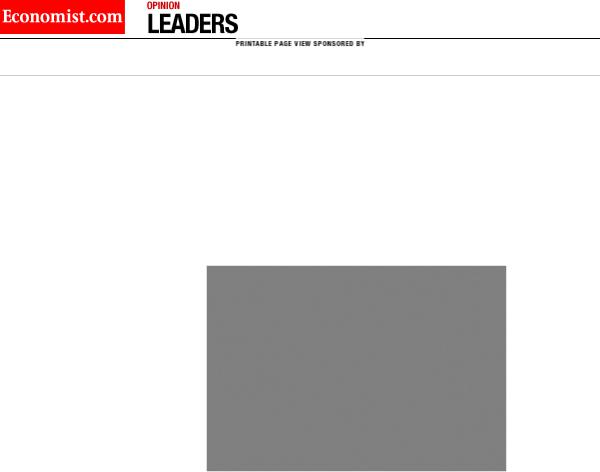
About sponsorship
Private equity
Caveat investor
Feb 8th 2007
From The Economist print edition
The real risks of private equity
Sharon Tancredi
TAKE an underperforming company. Add some generous helpings of debt, a few spoonfuls of management incentives and trim all the fat. Leave to cook for five years and you have a feast of profits. That has been the recipe for private-equity groups during the past 20 years.
Private equity has been so successful that it is getting ever bigger and bolder (see article). Rarely a day goes by without some new multi-billion-dollar scheme. On the table now are J. Sainsbury, a British retailer, and Equity Office Properties Trust, an American property group—which, valued at some $40 billion, would be the biggest deal ever.
Rampant expansion has won private-equity groups plenty of enemies. In 2005 Franz Münterfering, a German politician, described them as “locusts”, intent on sacking workers and making a quick euro. More recently, Philip Jennings, the general secretary of the UNI trade union, summarised the industry's philosophy as “buy it, strip it and flip it”. Some fret about the growing tendency for private-equity groups to club together to bid for large companies—is that anti-competitive behaviour or simply a wise effort to spread risk? Others complain about the conflicts of interest in management buy-outs. Might not executives with inside knowledge help a private-equity group buy their company cheaply so as to make more money years later when it is eventually sold on?
Some of this fuss reflects the culture shock in countries suddenly facing the full rigours of AngloAmerican capitalism. To the extent that private-equity groups release capital from unprofitable firms and supply it to thriving ones, so much the better. Private equity arguably represents an improvement on late 20th-century governance, when management and ownership were strictly separated. By contrast, private-equity groups keep a close interest in the companies they own, while executives benefit from the discipline of incentives and a high debt burden, which stops them wasting cash.
Because the ultimate buyers want a company with prospects, private-equity groups tend not to trash the businesses they back. Research by American academics has found that companies refloated on the stockmarket after private ownership performed better than other new issues did. Club deals are less about collusion than about pursuing quarry that a single fund would have trouble swallowing. And although in theory the danger exists that managers may collude with private-equity purchasers to cheat shareholders out of a fair price, in practice buyers seem more at risk of paying too much.

The other PE ratio
The people who should really be concerned about the private-equity boom are rarely mentioned: investors. The rush into private equity is part of a drive into “alternative” assets (a category that also includes hedge funds, property and commodities) and away from shares and government bonds. But private-equity returns are not really very “alternative”, since the forces that drive them also drive the stockmarket. As the manager of a traditional fund puts it: “I fail to understand why it's a good idea for clients to take money away from me and give it to private-equity groups who charge higher fees for buying quoted shares at a 20% premium.”
Studies suggest that investors have so far done well out of private equity, with the average buy-out fund beating the S&P 500 index in 1980-2001. But these figures come with a large health warning. First, the 1980s and 1990s saw generally falling interest rates and rising share prices—the ideal background for private equity to succeed. Second, the modern private-equity industry is built on a far greater scale than a decade ago.
In 1991 just 57 funds jostled for deals, according to Private Equity Intelligence, a research firm; by the end of last year, 686 were in the chase. The $430 billion private-equity funds raised was more than the industry drummed up between 1990 and 1998. As more money piles into the business, groups could lose their focus, and competition could push up the prices for deals and force down future returns. Indeed, research shows that the more money is raised by private-equity funds in any year, the lower returns tend to be. The last peak for fund-raising was 2000, the year of the dotcom crash.
And there is a sting in the tail. A small number of private-equity groups consistently earn above-average returns, whereas the rest do far less well. New investors may be unable to gain access to the top groups and end up funding the laggards. If the benign conditions of the 1980s and 1990s are not repeated, those investors could be sorely disappointed.
Copyright © 2007 The Economist Newspaper and The Economist Group. All rights reserved.
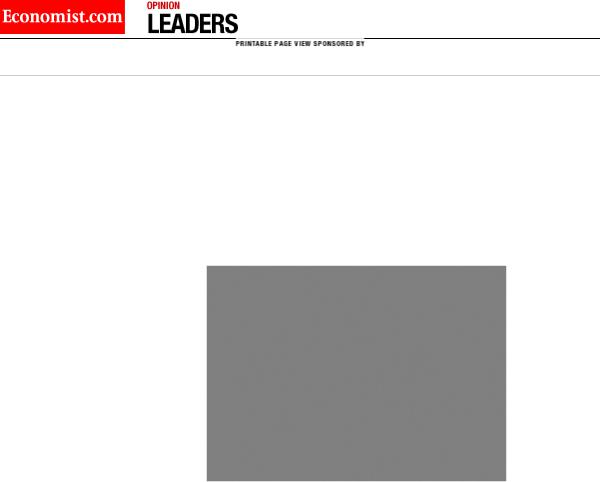
About sponsorship
Bird flu and public health
Under the influence
Feb 8th 2007
From The Economist print edition
Be concerned about avian influenza, but for the right reasons
AFP
Get article background
THE British press does love a good panic. It did its best to stir one up over the weekend after some turkeys on a farm in the east of the country contracted influenza of the dreaded H5N1 strain, and it transpired that 160,000 birds were going to have to be killed and cremated in order to stop the disease spreading (see article). Questions were asked about whether the government had reacted too slowly in imposing a quarantine zone around the infected farm (no doubt the opposite questions would have been asked had such a zone been imposed as the result of a false alarm). Grave advice was dispensed on whether or not turkey meat was still safe to eat (it is). But most of all, everyone worried about the implications for human health of what is—though it has indeed claimed some human victims—still basically a bird disease.
Don't panic
That worrying matters—not because there is no risk to human health (there is, but it is small and restricted to those who come into close contact with infected birds), but because such panics risk doing two opposing things. One is that they act as “social vaccines”, inuring public opinion to the need for vigilance. The other is that they focus anxiety on the particular, when it is the general that needs attention.
Avian influenza H5N1 was first identified in 1997 when there was a huge outbreak in Hong Kong. After that shaky start, the world has responded fairly well to the risk of this particular virus mutating in a way that would allow it to pass from person to person rather than merely from bird to person. Drugs that act against a range of influenza viruses are being stockpiled for rapid deployment. The planet's vaccinemaking infrastructure is about to be overhauled to allow billions of doses, rather than mere millions, to be churned out—and much of the new capacity will be built in poor countries. In some places, at least, ruthless monitoring of poultry flocks has reduced both the avian disease and the (already rare) cases of people becoming infected.
When it comes to the monitoring, there are some unlikely heroes. Vietnam's frightening bureaucracy has been deployed so effectively that no human case of avian flu has been seen in the past year—though

China, in the past, used its own bureaucracy to cover the disease up. Identifying human cases and isolating them quickly is important because the shortest route to a version of the disease that is dangerous to the whole of humanity rather than just vets and poultry farmers is simultaneous infection with both bird influenza and the human variety, and the exchange of genes between the two. This could create a form of the disease that has the virulence of the avian infection, but which passes from person to person with the ease of the human one.
However nasty influenza is, though (and it can be very nasty indeed), it is what Donald Rumsfeld would call a known unknown. Drugs can be deployed; vaccines developed; victims quarantined. What should really worry policymakers is the unknown unknowns.
That animal diseases jump the species barrier from time to time is well understood. AIDS, for example, is caused by a chimpanzee virus that made the leap around 1930, whereas severe acute respiratory syndrome (SARS) came from either bats or civets in 2002. But no one knows which disease will be next, what animal will be its natural host, where it will happen, or how dangerous it will be.
In the face of that uncertainty, the most important thing is to have monitoring systems in place that are able to pick up unusual symptoms—any unusual symptoms. AIDS spread unnoticed in Africa for around half a century. When it arrived in America it was detected within months thanks to the vigilance of the country's Centres for Disease Control and Prevention in noticing clusters of a previously rare skin cancer that is often a symptom of immune-system collapse.
The sort of global vigilance that could detect a rare cancer becoming slightly less rare is hard to imagine, and would certainly be expensive. But compared with the damage that could be done by a pandemic— whether slow-burning like AIDS or the wildfire of influenza—it would be money well spent. Yet even today's small sums are paid out in the wrong place. Diseases emerge in Africa and Asia, where people mingle with animals day in, day out. That is where the monitoring and the research needs to go on. Cross-border co-operation is never easy, but if rich-world governments want to protect their citizens, the place to start is in a foreign field.
Copyright © 2007 The Economist Newspaper and The Economist Group. All rights reserved.
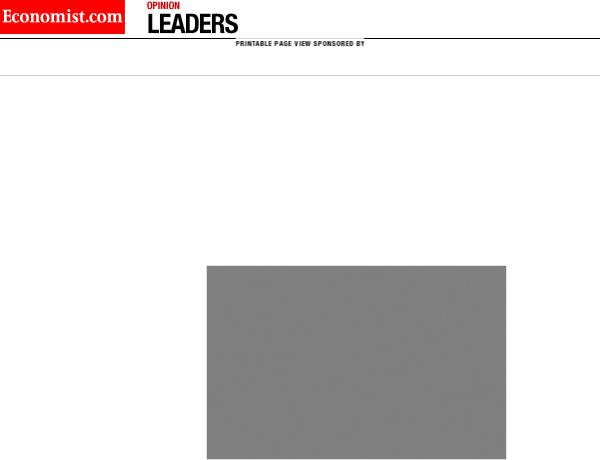
About sponsorship
Bangladesh
Not uniformly bad
Feb 8th 2007
From The Economist print edition
The army has intervened sensibly in Bangladesh's failing democracy. Now it must leave
AFP
Get article background
LIKE most human follies, military coups sound good at the time; and always fail. They sound good because what they replace is usually bad: riotous civilian leaders, corrupted institutions, stolen elections. They fail because beneath the chaos are political problems that soldiers cannot unpick. Bangladesh's generals took power by stealth on January 11th, forcing the president to declare a state of emergency and appoint a government of technocrats to do their bidding. One month on, this administration has fallen into the usual trap of failing to set a date for the election it has promised. All the same, this was a peculiar coup, and its failure is not yet assured.
Generals always claim to have been forced to take action. In this case the claim is true (see article). The democratic process had collapsed. The government they unseated was itself an unelected administration that had been appointed by the outgoing regime, led by the Bangladesh Nationalist Party (BNP), to supervise an election on January 22nd.
This caretaker arrangement was the result of chronic distrust between the BNP and its main rival, the Awami League (AL): neither of the parties, which have ruled Bangladesh alternately for the 16 years since its previous military government, trusts the other to hold a fair poll. The arrangement broke down mainly because the BNP picked a partisan caretaker to rig the poll. The AL screamed foul, boycotted the election and called its thugs onto the streets. More than 40 people were killed in political violence late last year. Had the election been held, there would have been a slaughter.
The generals were entitled under the constitution to avert this. But they and the technocrats they have appointed should understand that their duty now is limited. It is to organise, as swiftly as possible, the fairest election that Bangladeshis can reasonably hope for. And here a problem is emerging.
The administration has pledged to bring to justice top-level criminals (who are mostly politicians), depoliticise institutions, rewrite the electoral roll and take other measures that it says are essential to holding fair elections. It has also vowed to fix a power crisis, liberalise fuel prices and otherwise improve the economy. Its performance has so far been so good, and the memory of the BNP and what followed it is so painful that most Bangladeshis seem happy. But it will not last: Bangladesh is too troubled for the administration to achieve a fraction of its goals before the people lose patience. And Bangladeshis are a demanding lot. They rallied to drive the previous army government from power, and their continued zest for politics is one reason Bangladesh is so explosive.

The other is their appalling leaders, the BNP's Khaleda Zia and Sheikh Hasina Wajed of the AL—the women Bangladeshis call the “two begums”. Both inherited their parties from assassinated relatives, and have turned them into patronage-based personality cults. They also hate each other, and refuse to communicate, much less negotiate. The army hopes its crackdown might persuade the begums to retire. That would be as wonderful as it is unlikely. They are too popular and too good at mob politics to be ousted.
No bypassing the politics
It is in fact the generals who must withdraw, after an election by the end of the year that they have done their best to ensure is fair. That will give Bangladeshis the opportunity, though perhaps a few elections hence, to start to resolve their problems peacefully. Such problems cannot be ended by military fiat. The feud between the two begums is a distorted image of many nationwide divisions: between the cities and the villages, between secular and religious, between those who fought for liberation from West Pakistan in 1971 and those, including many of the BNP's Islamist allies, who opposed it.
The country's wider problems call for a change in thinking. Bangladesh is uniquely imperilled by the main threats to global security: climate change, terrorism and state failure. Almost half the overpopulated country lives near sea level; 40% of its area is flooded each year. It would be miraculous if the army's intervention shocked the country's battling small-minded politicians into a new and urgent policy of building dykes and embankments against the rising seas.
Copyright © 2007 The Economist Newspaper and The Economist Group. All rights reserved.
